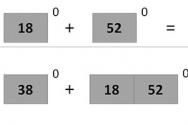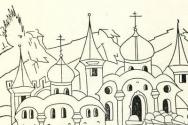Presentation for the work of I.S. Turgenev "Asya"
Goals and objectives of the lesson:
- the formation of a sense of beauty through the poetic text of the story, music;
- introduce students to a literary work of the 19th century, studying from the point of view of the concept of historicism in literature;
- teach eighth-graders textual analysis of a story and analysis of an episode of a work, see and understand the meaning of details in literary work;
- teach children to understand the “psychologism” of the story, to understand the means of expressive language.
Equipment:
- portrait of I.S. Turgenev;
- on the board:
- topic of the lesson;
- epigraph “And happiness was so possible” (A.S. Pushkin);
- “Happiness has no tomorrow...It has a present - and that’s not a day - but a moment” (I.S. Turgenev); - “theater decoration”: one half of the board is designed as a window with a sill; on the windowsill there is a pot of blooming geraniums, a candlestick, an open book with a dried sprig of geranium on it, next to it are yellowed pieces of paper folded with notes.
During the classes.
Love, love is a mysterious word.
Who could fully understand you?
Are you always old or new in everything?
Longing of spirit or grace?
It was no coincidence that I started the lesson dedicated to I.S. Turgenev’s story “Asya” with these poetic lines. Why do you think? Yes, the main thing in the story is love. Everything about her, about love, about the serious and strict, about the intimate and important...
Love... is probably the most mysterious of all human feelings, and Turgenev, perhaps one of the few writers, perceived with poetic trepidation the birth of an eternally young feeling - love. How to cope with heart disease, how to overcome sadness? Unrequited love - what is it? How can you be the first to say “I love you” to a person you’re not entirely sure about? How to endure the suffering of rejected love and offended feelings? And in general, how this sacrament of love is performed, how a miracle happens: the world magically changes for the one who falls in love. The colors become brighter, the sounds become clearer! After all, having fallen in love, a person feels more subtly, sees more sharply, his heart opens to beauty, goodness...
Questions, questions... we won’t find direct answers from Turgenev, but all Turgenev’s heroes undergo a “test of love,” a kind of test for viability. loving person, according to Turgenev, beautiful, spiritually inspired. One of the researchers of creativity I.S. Turgenev, P. Annenkov, wrote that Turgenev’s stories and stories are united by one feature - each of them contains a “psychological riddle.” So today we have to try to solve this psychological riddle, to understand what means the writer uses in order to reveal to us the secret of spiritual experiences; trace how N.N. met with the Gagins develops into a love story, which turned out to be for the hero a source of both sweet romantic longing and bitter torment, which later, over the years, although they lost their sharpness, doomed the hero to the fate of a bore.
So, let's turn to the text of the story.
The story is written in the form of a story by N.N. about how many years ago he traveled around Europe and in a small German town he met and became friends with Russians: Gagin and his sister Asya. The narrator reports not only on events, conversations, describes the situation, but, most importantly, reproduces the story of his love, relives the past.
- What can you say about N.N. , on whose behalf the story is told? How did he perceive the world around him?
N.N. - a rich nobleman, an artist at heart; he is obsessed with observing, especially people; he is an idle traveler, an observer.
- What amazed N.N. Gagins? when we first met?
N.N. perceives brother and sister as people of different psychological levels, and portrait characteristics amaze the reader with accuracy and brevity. The narrator noted the obvious dissimilarity and internal contrast of the Gagins. This further sharpened his curiosity and receptivity. True to the habit of observing people and reading their souls by the expressions of their faces, by involuntary gestures, the narrator, at the first meeting with Asya, notes something of his own, special in the features of her dark face, in her hairstyle, in her demeanor. He describes Asya’s behavior in detail and devotes himself entirely to observing her movements, gaze, and smile.
- The story about the first day of meeting the Gagins ends with a lyrical landscape; read it.(Reading the text of the story is accompanied by Strauss's waltz “Over the Blue Danube”).
- Does this landscape correspond to N.N.’s mood?
Landscape miniature becomes a means of expressing the romantic exaltations of the hero. The meeting with the Gagins sharpened his attention to beauty. Therefore, he devotes himself entirely to contemplation and an elevated mood.
- What is N.N.’s state of mind? after the first day of dating?
Mr. N.N. all pampered with sweet languor and expectation of happiness.
- Where did you meet N.N. with Gagin Asya on the second day of meeting?
Asya sat on the ledge of the wall on the ruins of a feudal castle directly above the abyss. This speaks about the romantic nature of the heroine.
- What feeling does Asya evoke in N.N.? Can you confirm it with the text of the story?(Hateness, annoyance.)
According to her brother, Asya is “a free spirit, crazy.” N.N. she appears to be a semi-mysterious creature, a “chameleon”.
- What “roles” does Asya play? Why is she doing this? Can N.N. answer this question now?
She played the role of a soldier marching with a gun, and this shocked the prim British; at the table she played the role of a well-bred young lady; the next day she introduced herself as a simple Russian girl, almost a maid... To answer the question why Asya behaves this way, N.N. he still can’t, because he doesn’t understand either Asya or himself.
- How does the second day of dating end?
The hero is not aware of what is happening to him. He feels some kind of vague uneasiness, which grows into an incomprehensible anxiety, an unpleasant annoyance; that jealous suspicion that the Gagins are not relatives.
- How is the hero’s moral and psychological state conveyed through the landscape?
Some obscure dark forces burst into the hero’s consciousness, remaining vague, alarming and even annoying. The “deadly” heaviness, incomprehensible to the hero, as the first bursts of unconscious feeling, resolved in the hero’s consciousness into a bitter, burning excitement, into longing for his homeland.
Two weeks of daily meetings have passed, N.N. He became increasingly upset by jealous suspicions and, although he did not fully realize his love for Asa, she gradually took possession of his heart. He found himself at the mercy of this feeling . What was the dominant mood during this period?
Persistent curiosity and some annoyance at the girl’s mysterious behavior, the desire to understand her inner world. (Read the beginning of Chapter 6.)
- How is N.N.’s suspicion confirmed? that Gagin and Asya are not brothers and sister?(Overheard conversation in the gazebo)
- What feelings take possession of the hero after this? (end of 6 - beginning of chapter 7)
The hero himself does not find a definition for his feelings. But we, the readers, understand that he was already captured by a deep and disturbing feeling of love. It is from her that he leaves for the mountains, and when he returns, after reading a note from Gagin, the next day he goes to them.
- What did N.N. learn? about Asa from Gagin's story? ( Selective retelling of Asya's story).
- How does the hero’s state of mind change?
He instantly regains his lost balance and defines his state this way: “I felt some kind of sweetness, precisely sweetness in my heart: as if honey had been secretly poured into me. I felt at ease after Gagin’s story.”
After the conversation about Asa, a new phase followed love relationship Turgenev's heroes: now there is mutual trust and rapprochement. What did N.N. discover? for yourself in Asa? Why did he like her?
Reassured, N.N. realized that the strange girl attracted him not only with her semi-wild charm, but he liked her soul.
Everything around the lovers is illuminated with a magical light: “I looked at her, all bathed in a clear ray of sunshine, all calm and meek. Everything shone joyfully around us, below, above us - sky, earth and waters; the very air seemed to be saturated with shine.” (Ch. 9) Asya says to her beloved: “If you and I were birds, how we would soar, how we would fly. They would have drowned in this blue…” How to understand these words?
Love inspires a person, lifts him up from everyday life. Literary critic M. Gershenzon wrote: “Here is the image of love, according to Turgenev (he loved allegorical scenes): love swoops down on a person like a thunderstorm on a clear day, and in the stunning whirlwind of it, the soul suddenly grows wings, the person turns into a bird, with swift flight birds, with their indomitable will."
What did N.N. feel? on this day after Gagin’s message about his sister’s story, a cheerful waltz with Asya and her call to imagine that they had grown wings?
N.N. I felt, on the one hand, a secret anxiety in my heart, on the other, an intoxication with the joy of getting closer; The thirst for happiness was kindled in him.
- How does Turgenev help us, readers, understand the psychological state of the hero at this moment?
Through a landscape sketch. ( Fiction reading excerpt from chapter 10 against the background of the sounds of a Strauss waltz) The landscape seems to absorb the psychological state of a person, becoming a “landscape” of the soul.
Poisoned by the sweet poison of a boiling feeling, the romantic hero finds anxious anticipation and anxiety in everything: “there was no peace in the sky,” in the “dark, cold depths” of the river with the quiet murmur of water behind the stern, in the whisper of the wind - an alarming revival was felt everywhere. It is at this moment of merging with nature that a new leap is made in the hero’s inner world: what was vague, anxious, suddenly turns into an undoubted and passionate thirst for happiness, which is associated with Asya’s personality, but which the hero has not yet dared to name.
Time seems to stop for the hero, overflowing with the expectation of happiness, and only after Asya’s bitter admission that “her wings have grown, but there is nowhere to fly” (what did Asya hide under these words, how can we understand them?), our hero decides to think about the question : “Does she really love me?”
- And what does the hero himself feel, what is happening in his soul?
His own feeling developed “in the half-asleep of consciousness,” according to his own recollections. Sweetness in the heart, the joy of trust and the thirst for happiness still leave the hero in semi-conscious contemplation. The hero prefers to madly surrender to the oncoming impressions: “I’m not only thinking about the future, I didn’t think about tomorrow, I felt very good.” Psychology of the contemplator, comprehending beauty, experiencing romantic love, involves a slow pace and internal stop, deepening into oneself, reflection (reflection full of doubts, contradictions; analysis of one’s own psychological state).
And Asya? Close to the “earth”, passionately and wholeheartedly feeling, she could not be satisfied with pointless dreams. And so, without thinking about the consequences, without calculation and caution, she makes an appointment with her beloved. “Another would have been able to hide everything and wait, but not she,” - according to his brother’s correct understanding (chap. 14)
- In what condition was N.N. walking? on a date with Asya?(Doubt, hesitation)
And here it is, the most exciting scene of the story - the date scene. (Selective reading of the scene by the teacher).
Did you like N.N. in this scene?
- What didn’t you like?
- What does he accuse Asya of?
What does he want to justify himself in?
The hero's behavior in the dating scene seemed outrageous to many critics - Turgenev's contemporaries. However, without justifying the hero or condemning him, let’s try to understand. The date scene is an example of Turgenev’s psychologism. The author focuses on the development and change in the psychological state of the hero.
- Why N.N. came on a date?
Judging prudently, N.N. I came on a date in order to part with Asya forever. “I can’t marry her. She won’t know that I loved her too.” However, something touching, helpless in Asya’s timid immobility touches the hero so much that he surrenders to the impulse of natural feeling and thereby comes into conflict with by decision and with the word that he gave to Gagin. Implicitly, he understands that the decision to break up with Asya does not correspond to the truth of his feelings (remember, “I still didn’t know how the date could be resolved”?). the hero sincerely felt that his feeling was in the ripening stage, and the situation required an immediate solution. Hence his annoyance at the frankness and haste of Asya and Gagin. He condemns in his heart what he says to Asya on a date, since the words do not correspond to his feelings. At the same time, the hero, together with the author, tries to understand the state of another person, but only captures the external manifestations of someone else’s “I”.
- How does Asya behave during N.N.’s reprimand?
N.N. wanted to torment the girl by clarifying his attitude towards her. He, the contemplator, needed time, stopping and thinking about his experiences. And he was surprised by Asya’s reaction to the rebuke.
So, the hero himself came to his misfortune: where an impulse of selfless love was required, he surrenders to reflection (chap. 17).
- And when does the hero realize that he loves?
Later, after the date, when he is looking for Asya, when he is afraid that misfortune is possible, that Asya might kill herself. (Chapter 19).
Why didn’t N.N., having heard from Gagin that Asya had been found, insist on talking right away? How does the author feel about this behavior of the hero?
Turgenev condemns his hero. And N.N. himself speaks sarcastically about his decision to be happy tomorrow (chap. 20).
But these are the words of a man twenty years older than the young N.N. we are talking about now. And then, in what state does N.N. return? home?(end of chapter 20)
- What happened the next day? Did N.N. understand? your mistake, have you condemned yourself?? (end of chapter 21).
- Why didn’t the heroes’ happiness take place? Why did they split up?
Because Asya and N.N. have spiritual life. proceeded differently. Asya experienced a climax of feelings during a date, and N.N. at that moment he was ready only to enjoy romantic contemplation; he did not then feel in himself that he was removing prudence and caution. The awareness of the feeling of love came to him later.
The reason for the life drama of the heroes lies in the difference in their psychological make-up and their temperaments. N.N. – a romantic with a contemplative attitude towards the world; this in some situations does not allow the hero to comprehend his attitude towards people in time and even to understand himself; this does not allow him to take the right action. Asya lives by the direct movement of her heart: not a single feeling in her is half-hearted.
So, we traced the development of the hero’s feelings, experienced with him the psychological changes in his soul.
Love is a mystery. The narrator had to face it, and Ase fully realized his feelings only when everything was lost, lost because of a word not spoken at the right time. But the feelings were not forgotten: twenty years have passed, and N.N. remembers everything down to the smallest detail, sacredly preserves the “sacred relics” of love. (We turn to the theatrical decoration of the lesson: a dried sprig of geranium, notes...)
The seal of first love will not be erased.
We will remember each other all our lives;
Both will have common dreams;
Let's deceive the mind and close the heart -
But longing for the past will not die,
And love won’t come, won’t come -
No, love won't come!
V.S.Kurochkin
I.S. Turgenev
"ASYA"
I sit huddled in a corner; and in my head everything rings and rings:
How beautiful, how fresh the roses were...
And I see myself in front of a low window of a Russian country house. The summer evening quietly melts and turns into night, the warm air smells of mignonette and linden; and on the window, leaning on her straightened arm and bowing her head to her shoulder, a girl sits - and silently and intently looks at the sky, as if waiting for the first stars to appear. How innocently inspired are the pensive eyes, how touchingly innocent are the open, questioning lips, how evenly does the not yet fully blossomed, not yet agitated chest breathe, how pure and gentle is the appearance of the young face! I do not dare to speak to her, but how dear she is to me, how my heart beats!
So good, so fresh
there were roses...
The name of I.S. Turgenev is closely connected with the poetic and sublime feeling of love.
Turgenev has everything about the movements of the heart, about youthful aspirations, in a word - about the ebullience of life, “young and fresh.”
Turgenev's girls... How much controversy and admiration they caused among their contemporaries, and many decades later! The images of Turgenev’s heroines formed into a single image characteristic of Russia "Turgenev's" girl.
Observations and conclusions about Asya’s character and actions will allow us to approach the concept of literary type
(generalized image) of the “Turgenev” girl.
We will try to answer the question: What is she like, the “Turgenev” girl?
The story is called "Asya". Why? What is the heroine's real name?
When does rebirth occur?
Anna - grace,
cuteness
Asya (from Anastasia) –
born again
Describe Asya's appearance
(Ch. 2)
Read the characteristics of Asya given by Gagin
What appearance is made up of these characteristics?
What is behind Asya's external features?
What is its strangeness?
What explains this strangeness in Asya’s behavior? What secret does N.N. learn? from Gagin?
What can you say about the hero of the story, Mr. N.N. ? What are his activities and hobbies?
When does the hero begin to admire nature?
Does N.N. understand that Asya will not pass him by in this life? Is it possible to love Asya?
A soul that is impossible not to love...
Is Asya capable of sincere strong feelings?
Answer the question by rereading the conversation
brother and sister (ch.6)
Honesty, moral purity, the ability to have sincere strong feelings.
Why doesn’t N.N. want to visit the Gagins after this overheard conversation?
But what happens to this feeling?
Reading the dialogue between Asya and N.N (Work on Chapter 9)
How do Asya's dreams characterize her?
Focus on the future...
Is Asya trying to be loved too?
Is she able to do something to please her loved one?
(Working on chapters 11 - 12)
Strong character, ability to self-sacrifice.
Meanwhile, Asya logically completes the development of her character: she writes a note, making a date with N.N. Let us remember the words of Gagin, who compares Asya to fire:
“She is able to get sick, run away, and make an appointment with you.”
Can a girl get a date now?
How does this act characterize Asya?
Activity, independence in deciding one’s destiny. (Work from chapter 16)
Love in Turgenev’s view is an element,
These are not rules, not laws. Love cannot be doubted, it cannot be put off until tomorrow (“Tomorrow I will be happy”).
Love is a storm of feelings, moonlight and a moon pillar... which our hero breaks. He broke it - and Asya is gone!
Who is there?
After the breakup scene, Asya does not appear on the pages of the story because she was born new woman- Anna Nikolaevna, who will no longer look at the world with “light black eyes,” will not “laugh with a quiet, light laugh,” will not dream of flying. Yes, she will remain a pretty grace (Anna),
but Asya will no longer be...
So, the whole story has been told, but there is still chapter 22. Why is it?
Couldn’t what happened be repeated, I thought, and even better, even more beautiful?.. I knew other women - but the feeling that Asya aroused in me, that burning, tender, deep feeling, did not happen again. No! Not a single eye has replaced those eyes that once looked at me with love; to no one’s heart, falling to my chest, has my heart responded with such joyful and sweet fading! Condemned to the loneliness of a familyless beggar, I live out boring years, but I keep her notes and a dried geranium flower, the same flower that she once threw to me from the window, as a shrine.
...And there in the distance, where the grove is so foggy, Where the ray barely flutters over the path, - Elena, Masha, Lisa, Marianna, And Asya, and the unfortunate Susanna - Gathered in an airy crowd.
Familiar whimsical shadows, Creatures of love and beauty, And virginal and feminine dreams, - They were brought to life by a pure, gentle genius, He gave them form, colors and features.
If it weren’t for him, we would not have known for a long time the suffering of a woman’s loving soul, her cherished thoughts, silent sadness; Only with him those songs that were hidden in silence sounded for us for the first time.
He disturbed the silence of the stagnant waters, He gave a loud answer to secret requests, From the darkness he brought the woman into the light, Into the wide world of aspirations and consciousness, On the path of living delights, battles and troubles.
K. Balmont “In Memory of Turgenev”
"Tomorrow I will be happy..."
« Happiness has no tomorrow; he doesn’t even have yesterday; it does not remember the past, does not think about the future; he has a present - and that’s not a day, but a moment …»
« Couldn’t what happened be repeated, I thought, and even better, even more beautiful?..”
So what is she like, a “Turgenev” girl?
A girl who can give happiness.
Sources sources sources
http://s013.radikal.ru/i324/1403/2f/67841f64650c.jpg
http://disfo.ru/uploadc/forum/Ii/BEfqmZrB_800x800.jpg
https://www.stihi.ru/pics/2013/02/25/10053.jpg
http://img-fotki.yandex.ru/get/9090/56808773.c3/0_a58ed_f90e0bfc_XXL.jpg
http://www.kagitinstudio.com/uploads/albums/25/667d26259b4a6a8c817845098de4511a.jpg
http://img1.liveinternet.ru/images/attach/b/4/104/336/104336581_4610804007_1efa0b05a9_o.jpg
http://img0.liveinternet.ru/images/attach/b/4/104/336/104336220_ba3606e0253e.jpg
http://img1.liveinternet.ru/images/attach/b/4/104/336/104336585_4611413354_6faf9644d4_o.jpg
http://img-fotki.yandex.ru/get/4810/122263170.1d7/0_2acf6e_75677780_XXXL.jpg
http://www.kulturologia.ru/files/u18476/FeminineBeauty-18.jpg
http://www.playcast.ru/uploads/2015/07/23/14431876.jpg
http://img0.liveinternet.ru/images/attach/b/4/104/336/104336210_78d3317d1802.jpg
http://img1.liveinternet.ru/images/attach/b/4/104/336/104336219_20129100232957196.jpg
http://img0.liveinternet.ru/images/attach/b/4/104/336/104336584_4610804671_7a0526e01b_o.jpg
http://img0.liveinternet.ru/images/attach/b/4/104/336/104336582_4610804285_68b92a37c8_o.jpg
http://img1.liveinternet.ru/images/attach/c/9/108/424/108424563_ecpyoXdfepw.jpg
http://i.livelib.ru/auface/212153/l/9f81/Ivan_Turgenev.jpg
https://pp.vk.me/c5039/g226926/a_16061315.jpg
Compiler of the presentation, teacher of Russian language and literature, MBOU Secondary School No. * Mozdok, North Ossetia-Alania Pogrebnyak N.M.
Slide 1
Presentation on the story by I.S. Turgenev "Asya"
Compiled by T.V. Ishkova, teacher of Russian language and literature, MKOU “Ozersk Secondary School”
Slide 2

His story “Asya” by I.S. Turgenev wrote “with passion, inspiration, very fervently, almost with tears.” The childhood story of the heroine, the illegitimate daughter of a nobleman, resembles the fate of Polina, the daughter of Turgenev himself, who was raised first on his mother’s estate, then in the family of Polina Viardot.
Slide 3

«
Hello, humble corner of the German soil, with ubiquitous traces of diligent hands, patient, although unhurried work... Hello and peace!
Slide 4

“It was as if Asya was sitting on the ledge... Her slender appearance was clearly and beautifully depicted in the clear sky... “She wants to surprise us,” I thought, “what is this for? What kind of childish trick is this?” She suddenly cast a quick and piercing glance at me and laughed again. Her movements were very cute, but I was annoyed with her..."
Slide 5

The illuminated window on the third floor knocked and opened, and we saw Asya’s dark head. “I’m here,” Asya said, coquettishly leaning her elbows on the window, “I feel good here.” For you, take it,” she added, throwing Gagina a branch of geranium, “imagine that I am the lady of your heart.”
Slide 6

“I looked into this soul: a secret oppression was constantly pressing on her, her inexperienced pride was anxiously confused and beating, but her whole being strove for the truth. This strange girl attracted me not only with the semi-wild charm spread throughout her thin body - I liked her soul.”
Slide 7

“... Let's go, let's go... I'll ask my brother to play us a waltz... We'll imagine that we're flying, that we've grown wings...” A few moments later we were spinning in the cramped room to the sweet sounds of Lanner. Asya waltzed beautifully, with enthusiasm.
Slide 8

“What I felt was not that vague, recently experienced feeling of all-encompassing desires, when the soul expands, sounds, when it seems to it that it understands everything and loves everything... No! The thirst for happiness was kindled in me.”
Slide 9

... I looked at her: there was something touchingly helpless in her timid immobility. My heart melted... “Asya,” I said barely audibly... She slowly raised her eyes to me. Oh, the look of a woman who has fallen in love - who can describe you? They begged, these eyes, they trusted, asked... I could not resist their charm and pressed myself to her hand...
Slide 10

I quickly descended from the vineyard and rushed into the city..., walked around all the streets, returned to the Rhine and ran along the shore. I felt more than just fear... no, I felt remorse, the most burning regret, love - yes! Most tender love. I wrung my hands, I called out to Asya in the middle of the approaching night; I repeated a hundred times that I loved her, I swore never to part with her; I would give everything in the world to hold her cold hand again, to hear her quiet voice...
Slide 11

One word... Oh, I'm crazy! I didn’t tell her, I didn’t tell her that I loved her... I didn’t see them anymore. I didn’t see Asya... Not a single eye replaced those eyes that were once lovingly fixed on me, to no one’s heart, falling to my chest, did my heart respond with such joyful and sweet fading... I keep the dried up like a shrine a geranium flower, the same flower that she once threw to me from the window.
What is hidden under the term “Turgenev girl”. Asya reads a lot. Asya's illegitimacy. A soul that is impossible not to love. The hero needed determination. Turgenev girl. A complete picture of Asya's character. Images of Turgenev's heroines. Asya's image is endlessly expanding. Evil Rock. Reading of Goethe's poem. Asya’s imagination contains sublime human aspirations. Evaluation of the image by critics.
“Bazarov and Kirsanov” - Education. Main lines of dispute. Ideological differences between Bazarov and the elder Kirsanovs. Collection of material on heroes. Peasantry. Attitude towards others. Fathers and Sons. Disputes between the heroes of the novel “Fathers and Sons.” Test based on the novel by I.S. Turgenev. Nihilism. Bazarov's relationship with N.P. and P.P. Kirsanov. Text assignment. Ideological conflict. P.P. Kirsanov. The life story of Pavel Petrovich. Bazarov. Education. Quarrel between P.P. Kirsanov and E. Bazarov.
“Themes of Turgenev’s “Prose Poems”” - Ivan Sergeevich Turgenev. Illustration for the poem “Threshold”. For the literature lesson. Poems. Bougival. Polina Viardot. A cycle united by a common tonality. Illustration for the poem “Old Man”. Poems in prose. Themes of poems. Thoughts and feelings. Creativity of I.S. Turgenev. Ivan Sergeevich Turgenev “Poems in prose.” Laconism and freedom.
“The work “Fathers and Sons”” - The harness is being damaged. Meeting of N.P. Kirsanov with his son. Low porch. A crowd of street servants. Fussing with hired workers. Alexander I. Forest. Terms. Poor region. Stages of development economic history Russia. Fathers and Sons. Concepts. Trouble. Tiny ponds with. Man and time. The process of decomposition of the feudal-serf system. Human.
“Gerasim and the heroes of the story” - Kapiton. Tatiana. The moral superiority of Gerasim over other heroes of the story. Physical handicap. Gerasim. Descendant's opinion. Lady. Russian prose writer. Moral superiority. Creation of the story "Mumu". Writer's creativity. Gavrila. Turgenev's childhood.
“The work “Bezhin Meadow”” - Slender boy. Bezhin meadow. Author. Events in the story. What the boys did at night in the meadow. What story was not in the boys' stories. Hunter. What struck the author about children. The face is small. White hair. Hair is disheveled. The boy was only seven years old. Ilyusha. Descriptions of the characters in the story.
“And happiness was so possible”
Target: learning to write an essay in the genre of diary entries
Equipment: multimedia presentation “Teaching writing an essay in the genre of diary entries”, an exhibition of writers’ diary entries, working materials for the student.
Teacher's opening remarks:
“Happiness has no tomorrow; he doesn’t even have yesterday; it doesn’t remember the past, doesn’t think about the future, it has a present - and that’s not a day, but a moment.”
Explain how these words help to understand the drama of the narrator of the story by I. S. Turgenev
(N.N. is lonely, he bitterly realizes that “his whole life has passed by. He loved Asya, but did not immediately understand it, and when he realized it, it was too late.
“When I met her in that fateful room, I did not yet have a clear consciousness of my love; it did not wake up even when I sat with her brother in a senseless and painful silence... it flared up with uncontrollable force only a few moments later, when, frightened by the possibility of misfortune, I began to look for and call her... but already then it was too late")
Find a description of the hero’s state of feeling remorse.
(I felt remorse, the most burning regret, love - yes! The most tender love. I wrung my hands, I called Asya in the middle of the approaching darkness, first in an undertone, then louder and louder; I repeated a hundred times that I love her, I swore never not to part with her, I was everything in the world to her, to hold her cold hand again, to hear her quiet voice again, to see her in front of me again").
Why does he call himself inconsolable?
(Did I really want such a denouement? Am I able to part with her? Can I lose her?)
She condemns herself for that act when, in a dark room, she, confessing her love to him, was rejected by him. He had the strength and spirit to tear her away from himself, even to reproach her for not allowing the feeling that was beginning to ripen to develop.”
"I didn't tell her I loved her." The confession stopped even at the last meeting with Ganin, and the last thread that the hero could still grab onto slipped out of his hands.
What does the narrator say about his future life?
(The feeling that Asya aroused in me, now a burning, now tender, deep feeling, has not been repeated. No! Not a single eye has replaced for me those eyes that were once lovingly fixed on me, nor on anyone’s heart that fell to my chest , my heart did not answer with such a joyful and sweet sinking! Condemned to the loneliness of a familyless little boy, I live out boring years, but I keep her notes and a dried geranium flower, the same flower that she once threw to me from the window, like a shrine.")
Can we say that the narrator is experiencing a personal drama?
(Yes, he is in shock, causing him moral suffering.)
Very often, personal experiences, mental anguish and pain, doubts require emotional self-expression. And then a sheet of paper and a pen, feather, pencil appear on which a person wants to express what just happened and what he felt.
2.Multimedia presentation with teacher's comments
Let's imagine that you and I are in an old noble house. Everything here reminds us of the life of the owners. In one of the rooms, into which a ray of sunlight shines through the half-closed window shutters, there is a table, on it an old bronze candlestick, an empty inkwell with a dried pen and a notebook with an inscription, already yellowed with time. "N.N." This is a diary, a repository of the innermost thoughts, experiences, and feelings of the narrator of the story “Asya”.
We open the first page - some landscape sketches, female profiles.
But the diary itself is empty. Today you and I have to create it, getting used to the image of N.N. and formatting it according to the rules of the genre of diary entries.
I think that you are more familiar with the definition of the word “diary” as a student’s notebook for recording assigned lessons and for making progress notes.
But this word also has a broader lexical meaning. In the explanatory dictionary of the Russian language by S.I. Ozhegov it sounds like this:
“A diary is a sincere, direct record of events that happened, emotional experiences, and moral thoughts. The diary genre is characteristic of the creative individuality of A.S. Pushkin, L.N. Tolstoy, I.S. Turgenev and many, many other writers and poets who kept diary entries for many years. They reflected the continuous work of thought of these artists, their deep thoughts and searches. Such diaries are close to a confession, in which the author talks with utmost frankness about complex moral and intellectual quests.
Writers and poets kept their personal diaries and used this technique in their works. The diary is introduced into the work as an element and opens up opportunities for depicting the inner world of the character, revealing the “history of the human soul.” We are familiar with the diary of Robinson Crusoe, the hero of the novel by Daniel Defoe, we will soon read the journal of Pechorin, the hero of the novel by M.Yu. Lermontov “A Hero of Our Time” ”, in which emotional experiences are revealed and the frankness of the character’s self-characteristics is emphasized.
However modern people keep diaries and record in them certain current events of their lives.
If you and I looked on the Internet now and went to the Site, we would see a window of 125 sites of various types of diaries: diaries of writers and poets, diaries of football players, artists, performers, housewives.
A diary is personal. They write about the most intimate things in it; it does not like prying eyes. This is the work of the soul, which is addressed to oneself or an imaginary interlocutor. Not everyone can entrust a personal diary to you, but today I do not mind opening the pages of my personal diary for you.
Do you keep diaries?
I think that your diaries are little stories about what you live, what interests you, what you think, what you feel. With the permission of the authors, I will now read a few excerpts from the diaries. (presentation)
HOORAY! Holidays are coming soon. There are 4 days left to study. Soon we will go on a long summer vacation.
I plan that over the summer I will have time to relax, visit my grandmother in the village,
The first day of summer. I sit and get bored. I listen to music. I was so looking forward to the holidays, but
Now I don’t know what to do with myself. I am waiting SMC from the girls and boys of our yard.
Will P. respond to my message?
A week has passed of my stay in the village with my grandmother. There are no friends here, alone
relatives: mom, dad, aunts, uncles, relatives. Previously, the presence of adults was enough for me
people, and now...BOREDOM! This month will seem like a year to me.
Probably, I have already grown up, and I need communication with peers. How I miss P., R., K.!
Today for the first time I thought about how people treat me. I noticed a lot of interesting things.
4. Is this post interesting for you?
Do the views on life and personality traits of the author of these recordings change?
(Vary depending on circumstances, events, mood, self-expression.) What can you say about the type of speech of this text?
(Narrative with elements of reasoning)
Can you say that you heard a diary entry?
5.What features of the style of diary entries did you note here?
Let’s fill out the table “Distinctive features of the genre of diary entries”
Dating
Indication of the location of events
The narration is in the first person
Notes based on initial impressions
Monologue of speech or internal dialogism
Fragmentary thoughts
Encryption or hiding of names and surnames
Reflection of the inner world
The presence of one-part, incomplete, exclamatory sentences
Use of emotionally charged vocabulary
6.The diary entry may reflect the following:
Analysis of the day's events
Reflections on what you saw and read
Emotional Self-Expression
Knots for memory
Portrait sketches
Confession
7. Determine which of the texts belongs to the genre of diary entries. Prove.
Text No. 1
He broke free and went abroad just to look at the world of God. He was healthy, young, cheerful, his money was not transferred, his worries had not yet begun. He lived without looking back, did what he wanted.
Text No. 2
June 10 I finally broke free, went abroad, not in order to “finish my upbringing,” but I just wanted to see the world. I am healthy, young, rich (what else do you need in life?), I want to see new faces, alive, human, to hear their speech.
June 13 I stopped in the city of Z, which is on the left bank of the Rhine, at the foot of two high hills. Great location!
June 14 I go to the Rhine. Majestic river! I sat all evening on a stone bench under a huge ash tree, through the branches of which the town of L was visible on the other bank.
8. Let's try to create a chronological table of events in which literary characters participate.
Date event replica state
9. Working with a reminder on writing an essay in the genre of diary entries.
Memo.
How to write an essay in the genre of diary entries.
Determine the idea of the essay, that is, the most main idea which you undertake to prove with your work. Correctly defining the idea will allow you to deeply and fully reveal the topic of the essay and not “drown” in the extensive material.
Make a plan that will help you outline where to start, what sections to highlight in the essay, what sequence to present the material in, and what conclusions you need to reach.
Compose chronological table events narrated by the literary hero.
Try to reincarnate, “get used to” the character, way of thinking, the actions of the hero on whose behalf you will write your work. To do this:
carefully re-read the hero’s remarks;
write down the main themes of his statements and thoughts;
pay attention to typical phrases for this character, speech structures, emotional and evaluative vocabulary;
remember the statements of other characters about this literary hero.
Keep in mind that the introduction and conclusion in an essay of this genre may have a frame that gives the work a personal character.
Remember that diary entries and letters help to track the development of personality and reveal the inner world of the hero. Check if your essay meets this requirement.








